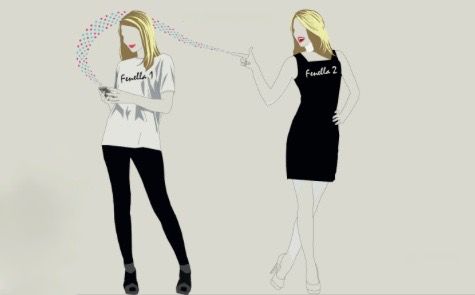

Smart, succesful, sophisticated and so far, single, Fenella Bond is living the life of a 21st century professional woman in Jersey. This month in Connect magazine, she writes about intention and how, in the era of big data, it is becoming increasingly irrelevant.
"In an era where invention is in the hands of us all, top-down thinking is becoming irrelevant.
"The law of unintended consequences is often cited as the reason bad things happen. You work hard to get a promotion because you need a pay rise to cover home
improvements - and end up staying late so often your husband gets fed up, starts going out more with the lads, gets talking to a girl in a bar, has an affair and leaves you, taking half the house with him.
"A scientist creates a brilliant product for killing "nasty" insects. It works so well it kills half the wildlife in your garden too; and some birds; and the neighbour’s cat which ate one of the dead birds.
"Your government causes swathes of companies to incur huge unforeseen costs and go bankrupt because they’ve voted through an amendment with no debate, because it was time for summer recess, or winter recess, or tea break - it doesn't matter which because they didn't intend it, or foresee it, so clearly they don't think it's their fault.
"From the trivial to the transformational, everything we do has an impact, whether we intend it to or not. Sometimes the impact is small and personal - other times its vast, affecting entire industries, countries, continents. Unforeseen consequences are not the same as poor planning or failing to think something through sufficiently to see that bad things could, and often will, happen, if you follow a certain path.
"One might predict that a relationship has a good chance of going wrong if you ignore the other person; that a product which harms certain creatures, may well harm others; that a government who does things in haste to appease sections of an electorate in the short term, may create issues for the same electorate in the longer term.
But people who point these sorts of things out today, who call for more thought, more research, or more time, are often shouted down for being too negative.

Pictured: It is worth working harder on a long-term relationship or better to start afresh?
"Enthusiasm is not the same as experience. But finding that sweet spot – that balance between knowing enough that you can do something well, but not so much that you get bored, is tricky. Should a company employ people who are good, or who want to be good? Can one get more satisfaction trying a new sport, activity, or career, or developing your expertise in an area you are already proficient in?
"Even with relationships, we may ask ourselves whether it is worth working harder on a long-term relationship and deepening our understanding of our partner and ourselves - or starting afresh. I suppose it depends whether we think we gain more from the start of a relationship, or from the end. Pleasure v wisdom. It's a hard call to make.
"You might question whether small differences in how we act towards ourselves, and to others are relevant in the grand scheme of life, when so much is outside our personal control. On the contrary – in the era of big data, the small differences are becoming much more significant than big gestures.
"For example, if someone asks you a "big" question, such as “how will you vote?” you might give a straight answer. Or you might lie. Or you might not know. Or you might not care. If some AI were to monitor the data about what you view online, which sites you visit, what links you click, and link this to data from, say, a Fitbit, monitoring your heart rate to see how your heart races when you read certain items (think something from the Daily Mail for a typical Guardian reader and vice versa) and then you can see how much more accurately a researcher could predict how you might vote than you might be able to predict yourself.
"It will, no doubt, not be long before we go out for dinner and find we are given menus tailored to our food preferences on Instagram. We already get shown sites on Facebook based on previous likes and clicks, book choices on Amazon based on previous purchases and suggested films on Netflix based on what we've previously watched.

Pictured: It won't be long before we find menus tailored on our Instagram feed.
"Do we like what we know, or know what we like? The more filtered our lives become the less we will know what else there is there to consider. The less we know, the less we will care about knowing, until we all eventually acquiesce to being governed by our own data predictors. Why make a decision yourself when your personal virtual assistant, your Fenella Two, or whatever you choose to call him or her, can analyse data faster than your brain, can recall stats, remind you of previous choices and previous outcomes, and then tell you “on the balance of probabilities you should choose X”?
"So, in this context, intention becomes irrelevant. We will no longer be able to say “we intended to do X” if all the data points another way. There will be huge ethical debates about who virtual assistants should be loyal to – us or the State, e.g. whether virtual assistants should be forced to hand over our data to the State if it is not in our best interests, and indeed, whether it is in our best interests to even decide what our best interests are. You only have to dip into the dispute between Apple and the US Government over backdoor security passes to our phones, and look at how hard states are pushing to get encryption companies to hand over the keys to their products, to see how ethics is at the heart of increasing numbers of issues.
"Who would have thought the ability to think like a philosopher could be one of the most valuable skills available to humanity? Certainly not all the parents who told their kids to study something practical at university, like STEM subjects. We study to become smarter, but sometime end up more stupid. We try to do good, but may do more harm. We embrace progress, to finish as philistines. What we intend is rarely what happens. Sometimes the outcome is a lot better than what we intended. The engineers who created Slack – a messaging tool that is very popular with tech firms – intended to create a new computer game, not a communications service. However, the by-product worked out better than the intended outcome.
"If politicians start proclaiming great intentions, it's advisable to question the relevance. When a politician like Theresa May stands up at Davos declaring the British Government intends to "help" the tech industry, one has to wonder whether it's pointless - the industry seems to have done pretty well without much government "help" or harmful - government interest can be the insta-kiss of death. But perhaps it's just a question of time before politicians become as irrelevant as most of the things they intend. Put AI in the hands of philosophers, and true democracy could rest in a few computer clicks. A little intention goes a long way."
Read more from Fenella Bond in each month's Connect magazine. Click for the latest edition.
Comments
Comments on this story express the views of the commentator only, not Bailiwick Publishing. We are unable to guarantee the accuracy of any of those comments.